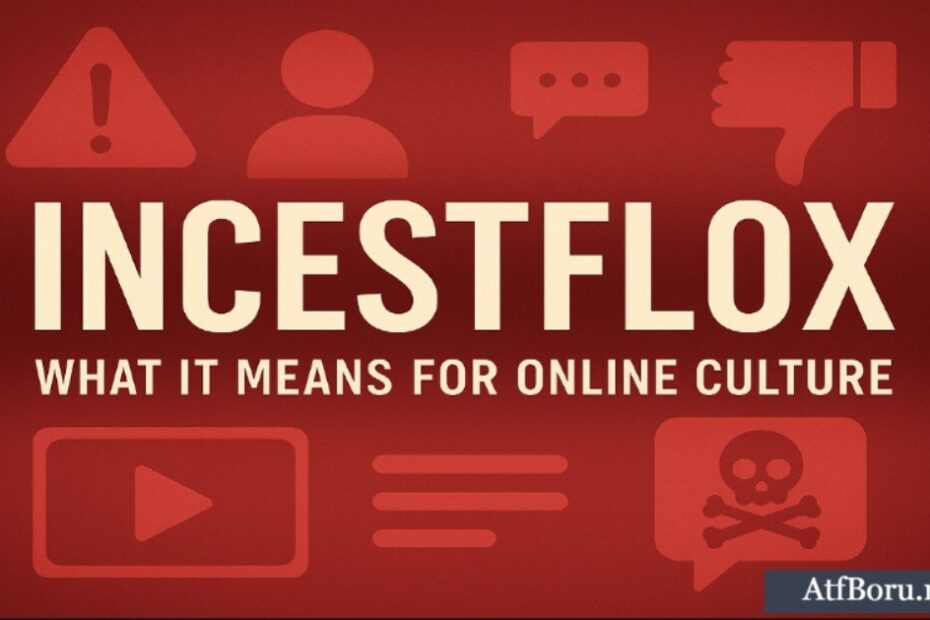Introduction
In the ever-evolving landscape of internet lingo, few words have caused as much confusion and controversy as Incestflox. Initially whispered across niche forums and meme spaces, it rapidly exploded into wider internet culture.
But what exactly does this term mean, and why has it become such a contentious topic?
From digital anonymity to social taboos, the term opens a window into how culture, language, and the internet intersect in today’s hyperconnected world.
In this guide, we break down the meaning of Incestflox, its possible origins, cultural implications, and how it reflects larger issues in online communication and internet ethics.
What Is Incestflox?

At its core, Incestflox appears to be a portmanteau or synthetic slang combining highly sensitive and provocative connotations. Although there’s no dictionary definition, it typically refers to:
- A digital behavior or narrative trend involving taboo family dynamics (real or fictional).
- A coded term used in online subcultures to discuss or satirize controversial tropes.
- A critique of algorithmic amplification—some argue the term is used to highlight how bizarre or disturbing content can gain traction online.
Important Note: The term is not rooted in medical, psychological, or legal contexts but is more reflective of digital satire, irony, and controversy.
Where Did Incestflox Come From?
Several theories exist:
- Originating from meme culture in fringe communities such as Reddit or 4chan.
- Evolved from shock humor, where taboo is used to provoke reactions.
- Possibly used to mock or criticize streaming algorithms that recommend inappropriate or suggestive content due to misclassification.
Why Is Incestflox Controversial?
1. Ethical Concerns
The primary concern around Incestflox lies in its proximity to taboo and culturally sensitive topics. While many use the term ironically, it can be easily misunderstood or misappropriated.
2. Internet Amplification
Algorithms can inadvertently spread extreme content for engagement. Incestflox may reflect a growing concern about how AI curates and promotes problematic themes.
3. Freedom of Speech vs. Online Harm
There’s an ongoing debate: Should the internet remain a space for unrestricted expression, even if the content is disturbing? Or should platforms take a more active role in filtering content that skirts the line of social decency?
How Incestflox Reflects Deeper Internet Culture Issues
Online Subcultures and Satire
Many terms, including Incestflox, are born from online irony or dark humor. These cultures thrive on pushing boundaries and often operate in “in-joke” formats, making them opaque to outsiders.
Algorithmic Disruption
Search engines and video platforms sometimes suggest content that’s inappropriate due to keyword misalignment or engagement-based algorithms. Incestflox is often referenced when discussing flawed content recommendations.
Psychological Impact and Digital Literacy
Being exposed to extreme or confusing content without proper context can be harmful, especially to younger audiences. Understanding how terms like Incestflox spread is crucial to promoting digital literacy and mental well-being.
Real-World Examples and Case Studies

Case Study 1: TikTok’s Algorithm Loopholes
Some users noted how strangely suggestive content made its way onto trending pages despite seemingly innocent hashtags. “Incestflox” became a sarcastic descriptor for such algorithmic failures.
Case Study 2: Reddit Threads and Debate Forums
Certain threads used the term as a metaphor to discuss the broader phenomenon of “content incest,” where platforms repeatedly recommend recycled, provocative content under different guises.
Case Study 3: Cultural Commentary
In some academic circles, Incestflox is now discussed as an example of digital moral panic, where online slang triggers debates over censorship, culture wars, and digital ethics.
The Role of Digital Platforms and Moderation
Should Platforms Intervene?
Yes, to a degree. Content moderation should focus on:
- Preventing misleading or harmful amplification.
- Promoting digital ethics without stifling creativity.
- Empowering users with reporting and customization tools.
How Can Users Stay Safe and Informed?
- Understand the context before reacting to or sharing viral terms.
- Use fact-checking tools and look for credible explanations.
- Report content that feels inappropriate or algorithmically misleading.
Summary of Key Aspects of Incestflox
| Aspect | Details |
| Origin | Meme culture, fringe forums, ironic slang |
| Meaning | Taboo-themed digital content critique, algorithm satire |
| Controversy | Taboos, misinterpretation, and amplification of harmful narratives |
| Digital Impact | Raises questions about algorithms, content ethics, and moderation |
| Current Usage | Mostly used in satire or critical digital discourse |
Expert Opinions on Incestflox and Internet Language Evolution
Linguists’ View
Experts suggest Incestflox reflects the internet’s shift toward chaotic linguistics, where new words are born daily from niche humor or backlash.
Psychologists’ Insight
Exposure to cryptic or controversial content may affect impressionable users, especially if they lack the tools to interpret context.
Digital Ethicists’ Take
These experts emphasize the need for platform accountability, particularly when automated systems accidentally boost problematic content.
Actionable Insights for Content Creators and Internet Users

For Creators
- Avoid exploiting controversial buzzwords for clicks.
- Focus on ethical content creation aligned with platform guidelines.
For Educators
- Integrate digital literacy lessons explaining how viral slang evolves.
- Promote discussions about critical thinking and online behavior.
For Parents
- Stay informed about online trends.
- Use parental tools and open dialogue to navigate digital life with your kids.
Conclusion
Incestflox may sound like a fringe buzzword, but its existence reveals much about how we consume, share, and regulate content on the internet today.
From algorithmic responsibility to cultural reflection, it is a cautionary tale about unchecked content virality and digital echo chambers.
Understanding its background, implications, and controversies helps demystify one term and the broader digital behaviors shaping online discourse. In an age where words can go viral in seconds, being an informed and critical user is not optional—it’s essential.
FAQs
What does Incestflox mean on the internet?
Incestflox is an internet slang term used to describe controversial or taboo content themes, often discussed ironically or critically in digital subcultures.
Is Incestflox a real word?
No, it’s a made-up term that gained traction through meme culture and online forums. It has no official dictionary definition.
Why is Incestflox trending?
It’s trending due to its provocative nature, algorithmic critiques, and discussions about inappropriate content being boosted online.
Is Incestflox harmful?
While the term itself isn’t harmful, its association with taboo subjects can be problematic, especially if misused or misunderstood.
What should you do if you see disturbing content online?
Report it immediately, avoid engaging, and adjust your algorithmic settings to filter inappropriate suggestions.
